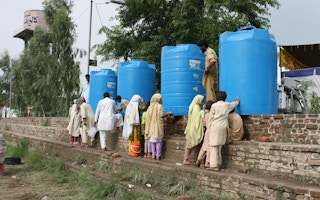The US Agency for International Development (USAID) is to set up a new body to promote resilience, a senior official said, amid growing pressure on the world’s top foreign aid donor to do more with less.
Creating resilience - the ability to withstand broad disasters ranging from climate change-induced floods and droughts to economic shocks and health epidemics - is seen as increasingly important if international aid is to work.
“The extraordinary cost of going back to the same places every three to five years with the humanitarian convoys is simply unsustainable,” said Greg Collins, USAID’s resilience coordinator, at a conference in New Orleans on Tuesday.
USAID had spent about $5 billion in Ethiopia, among the poorest nations in Africa, over the last 15 years, he told the Resilience Measurement, Evidence and Learning Conference.
The move comes amid talk of budget cuts to foreign aid in the United States and pressure from President Donald Trump to do more with less.
Experts said the creation of a new Bureau for Resilience and Food Security, which still has to be approved by Congress, would cement momentum behind the global poverty-reduction approach.
“
The extraordinary cost of going back to the same places every three to five years with the humanitarian convoys is simply unsustainable.
Greg Collins, resilience coordinator, USAID
The proposed Bureau for Resilience and Food Security would have about 180 staff, Collins said.
Lindsey Jones, a researcher at the Overseas Development Institute, expressed hope the new bureau would “open the door to have longer-term finance” for resilience programs.
He said other countries such as Britain and Sweden had tried to promote resilience in countries that received aid, but the fixed-term nature of their programs was a weakness.
This story was published with permission from Thomson Reuters Foundation, the charitable arm of Thomson Reuters, that covers humanitarian news, women’s rights, trafficking, property rights, climate change and resilience. Visit http://news.trust.org)










